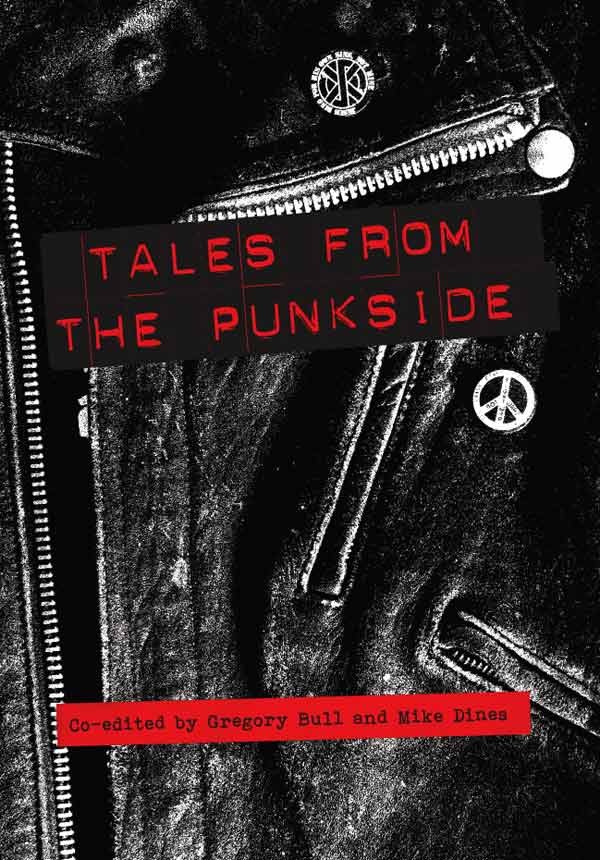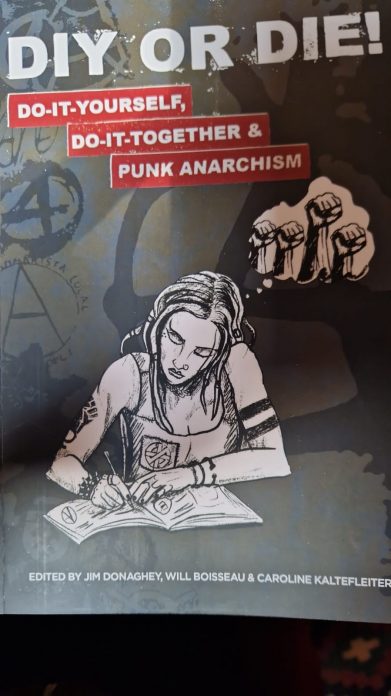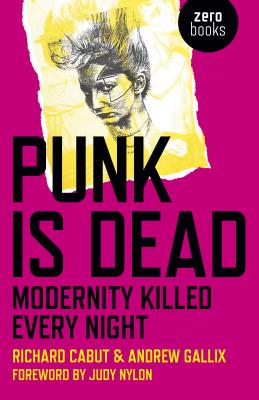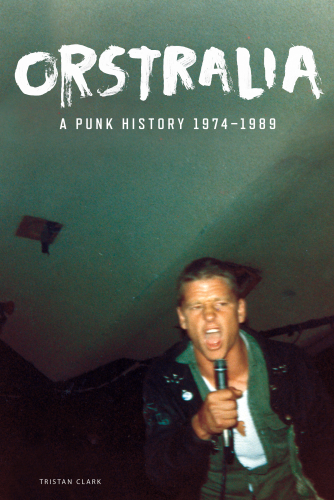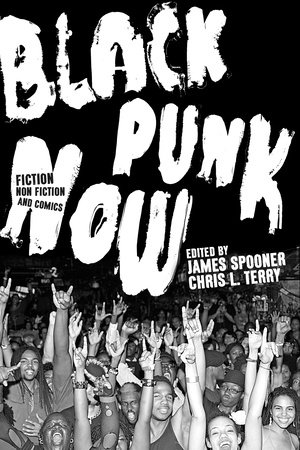The shop's shut for a few weeks over winter (16/12/25-9/1/26, and 22/1-15/2/26), you can browse but hang on with your orders until it's reopened - thanks!
Tales from the Punkside
£4.44
An eclectic collection of academic articles, personal recollections, short stories, artwork, poetry and more. An anthology of work about Punk.
Description
The Introduction
I first heard the term ‘anarcho-narrative’ from a close friend of mine who incidentally is not, was not, and probably never will be, a punk. It was not the actual concept that had drawn his attention, but rather the term ‘anarcho’: he knew that I had an interest in anarcho-punk and therefore jumped on the anarchistic leanings of this story-telling endeavour. Excited, he told me of this ‘unbook’ being published by two academic librarians, Andrew Walsh and Emma Coonan, a project concerned with what they saw as the linking of a ‘series of narratives connected by the overarching theme of information discovery journeys’.1 The remit was deliberately broad, allowing authors to be free to decide the appropriate structure of their submissions, as well as the format. Indeed, both editors encouraged budding writers to move away from more traditional contexts, instead promoting the use of poetry, transcripts of social media, illustrative fictional prose, or ‘whatever media seems appropriate to the author’. Although I found it a bit odd to see the term ‘anarcho’ in this context, the organic nature of the project grabbed my attention. Authors were empowered to write in their own style, with very little interference from the editors. ‘We hope the anarchical strand running throughout it manages to stand out’, write Coonan and Walsh, ‘using anarchy to mean the lowest possible level of organization, such as suits the reader or author rather than the editors or publisher. Although the print format imposes an element of central rule upon the book we’ve tried to make it as easy to break out of as possible’. Consequently, it was the emphasis on these two areas – the experimental freedom offered to the authors, and minimal editorial constraint – that drew me towards the publishing of my own project. Ideas began to form in my mind. What about the telling of everyday punk narratives by those who were there? How about asking writers to convey – through prose, poetry, art – the experiences that many had had but were never written down, like the squatting, the drinking, the glue sniffing? What about writing about being a provincial punk; of starting up your own punk band (that lasted for 3 months); or of missing your favourite band play live because your mum wouldn’t let you go out ‘looking like that?’ Perhaps I could provide a space for those punks to tell their own story? To write, in whatever context they felt comfortable, about their own experiences of punk?
At the same time as I was bringing the anarcho-narrative project to life, I was also involved in editing an academic work dealing with the anarcho- punk scene of the 1980s. I had sent out a ‘call for chapters’ – very much like I had done for Tales From the Punkside4 – but this time in a more ‘academic’ manner, and was getting ready to sort through proposals, putting together those submissions that would make a good academic volume. Afterwards I was to email those whose submissions were ‘successful’, outlining specific word-count, what style of font they should use (and of course what size), what referencing each author should use and what kind of date we are looking to receive first drafts. After reading and editing these first drafts I was to return them to the author to make necessary changes, and ask them to submit again at another deadline. Then, with a final reading, the volume would be sent off to an academic publisher, and the process would start all over again. Although necessary, this process seemed to detract from the subject matter somewhat, indeed adding further to the abstract stance of each chapter. Ideas had to be backed up by academic texts for instance, and methodology had to be deconstructed. And words such as, say ‘deconstructed’, had to be used to give the volume a sense of academicism.
I am certainly not condemning the academic process, I am after all an ‘academic’, but it seemed to me that the academic rigour of editing and submitting in this way somehow diluted the very essence of the subject matter we were dealing with. In fact, subject matter was almost relegated to second place behind academic hierarchies; of ‘I know more than you do’ debates and doctoral ‘fisticuffs’ behind the bike-sheds after school. And so, I decided to do something different. The academics would often have their say, but what about the many tales that I have heard from my punk friends and peer group, the many mischievous shenanigans that so many of my cohort had ‘got up to’, and the many scrapes and near-misses that these individuals had encountered? Where was the everyday, the ‘normal’ in these academic accounts? If academia was sometimes more concerned with theories and long words than deciphering the day-by- day comings and goings of those who defined themselves as ‘punk’, what about the individuals who felt no need to apply convoluted academic theories or debates to justify subcultural membership? It almost feels as if the academic has to encroach on the everyday, not allowing these tales any autonomy; to not let them sit on their own, for what they are, without interpretation or analysis. Yet, if I wanted to move away from the academic side of writing and editing, I also wanted to acknowledge other influences that made a real impact on me as I was growing up as a young punk. As well as annoying the hell out of my mum by playing Extreme Noise Terror at full blast, I also loved reading books that were deemed ‘punk fiction’, such as Gobbing , Pogoing and Gratuitous Bad Language (1996), an anthology of punk short stories edited by Robert Dellar, Seaton Point (1998), a novel written by seven authors (Robert Dellar, Ted Curtis, Martin Cooper, Rob Colson, Lucy Williams, Mally Mallinson and Emma McElwee) and Simon Strong’s A259 Multiplex Bomb Outrage (1995). These books, alongside the writings of Stewart Home and the poetry of Andy T portrayed a punk scene that seemed, ironically, more ‘real’, even though they were often classed as fiction, and in many ways blurred the difference between fiction and memoir. Indeed, it is great to see two recent publications – Ted Curtis’ The Darkening Light (2014) and Robert Dellar’s memoir Splitting in Two: Mad Pride and Punk Rock Oblivion (2014) – continue in this vein. As I write, I also realize a major flaw in my argument. After all, I’m critiquing academia for doing something that is, by its very nature what it is: the critical enquiry into ideas. And indeed, this type of debate has been raging in academic circles for a long time, since the publication of the Centre for Contemporary Cultural Studies’ Resistance Through Rituals: Youth Subcultures in Post-War Britain (1976) and Dick Hebdige’s Subculture: The Meaning of Style in 1979. Nor am I saying that all academic writing is bad. Quite the opposite. I suppose, I’m just saying, that’s all. I suppose I want that which I cannot have: a non-academic, non-judgmental piece of punk writing that just says something for its own sake, with no axe to grind, no theoretical position to defend and no need for a meet behind the bike sheds. I know it ain’t gonna happen, but it’s worth a try, hey? I am not saying that I have achieved this within Tales From the Punkside. Indeed, I’m not even sure if I have reproduced the ‘anarcho-narrative’ nature of the project as seen in the volume published by Walsh and Coonan. But hey, I’m not too worried about that to be honest. Instead, it has just been fantastic to read the tales of those who were ‘there’; those whose stories are not ‘important’ enough to sit alongside the memoirs of the punk rock ‘jet set’. I wanted to read stories of what it was like to squat in London in the 1980s, what it was like to live as a provincial punk. I wanted to read of the darkness of glue sniffing and to hear the memoirs of punk in other countries: in other words, to hear from the silent majority, those who did not have a chance to tell their tales of their punkside.
Although this book began in a rainy afternoon as an excited friend told me he’d seen that ‘A’ word, I would not have been able to complete it without the following people. Obviously I would really like to thank Greg Bull: his help in pulling the final project together at a time when work constraints were beginning to kick in was invaluable. Greg stepped in as a fantastic editor and project manager whilst I was stuck on a train to and from London. I would also like to say thanks to all of those who backed this project – obviously without their financial help it would have been far more difficult to get a print run – and hopefully another cash injection that will allow Itchy Monkey Press to continue. Thanks so much to you all – and I hope you like the book! A big thank-you to those who have contributed to the book and for giving up their time to tell us their tales of their punkside: each one as valuable as the next in terms of narrating personal experiences of punk. Thanks also to Alistair Livingstone, Lucy Robinson and Dunstan Bruce for allowing us to use their work, to Jon Leftley, Alastair Gordon and Matt Worley for their thoughts and Emma Coonan and Andrew Walsh for allowing me to swipe their idea. Last, but not least, I would also like to say thanks to Sam, Eric, Spike and Molly for inspiration. I hope you all enjoy the book!
Mike Dines – Summer 2014
Additional information
| Weight | 0.240000 kg |
|---|

